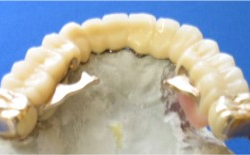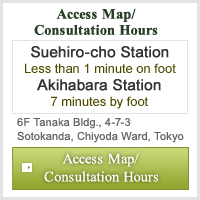2009年4月12日 « トップへ » 2009年4月14日
2009年4月13日
[Full dentures] are loose and the patient can't bite. They experience pain when moving their mouth
[First visit]
The patient came to our clinic stating the following reasons:
+ "My dentures are so loose that I cannot bite. It hurts every time they move..."
+ "It is a bother to talk in front of people".
The patient told us that they had an inferiority complex about their teeth.
![[Full dentures]](/images/case015.png)
They wanted us to help alleviate the pain so they could enjoy eating and get over their inferiority complex. We decided to treat with full dentures made using the maxillomandibular simultaneous impression method to address the patient's pressing concerns.
[Taking the first mold impression]
Comparing the dentures that the patient came in with to their teeth mold, we found out that the dentures where smaller than the space in the patient's mouth and were nearly completely lacking support from the mouth muscles.
![[Full dentures]](/images/case016.png)
![[Full dentures]](/images/case017.png)
We made a tool based on this model to create a precise mold.

[Second visit to the clinic]
![[Full dentures]](/images/case018.png) The picture below is of the Gothic arch. It is used to record the movements of the jaw. In this case the jaw movements were normal.
The picture below is of the Gothic arch. It is used to record the movements of the jaw. In this case the jaw movements were normal.

Using the upper tray, we take a precise mold of the upper and lower jaw. At this time we are simultaneously recording the position of the jaw in regards to the central point of the body, and measuring the height of the bite alignment.
As the mold is being taken, we have the patient swallow their saliva in order to recreate the state of the mouth muscles while eating.
![[Full dentures]](/images/case019.png)
![[Full dentures]](/images/case020.png) After taking the mold, we choose artificial teeth that match the patient's skin color and facial features.
After taking the mold, we choose artificial teeth that match the patient's skin color and facial features.

![[Full dentures]](/images/case021.png) We transfer the myriad data to a bite alignment device called an actuator. Then we make the dentures using this model.
We transfer the myriad data to a bite alignment device called an actuator. Then we make the dentures using this model.

We create a shape using wax before the dentures are complete, line up the artificial teeth and then check everything. This is when we make detailed checks for things like pronunciation, comfort, and esthetic beauty.
![[Full dentures]](/images/case022.png)

![[Full dentures]](/images/case023.png) We conduct polymerization using the Ivocup-System. This transforms the wax into a hard material.
We conduct polymerization using the Ivocup-System. This transforms the wax into a hard material.

This is when the completed dentures were first placed into the patient's mouth. We insert a bite alignment lead called a 'full-balanced occlusion'. The information put into the actuator matched up perfectly with the conditions inside of the patient's mouth.
![[Full dentures]](/images/case024.png)
We made a few final adjustments after putting the dentures in and the patient is now able to enjoy them as if they were a part of his own body. The patient was also very pleased that pronunciation improved dramatically thanks to the dentures.
*Cases introduced on the website are completely unique to the patients and actual treatment periods and methods vary for each patient.
My body is in no condition to go through implant surgery...
Q. My body is in no condition to go through implant surgery...
A. This is not a problem. There is no need for surgery as with implants.
We can treat your case within the scope of normal dental treatment. We can adapt to the needs of patients who were told that implants are too difficult, elderly patients, and patients who suffer from a range of systemic diseases.
I would like to get implants, but it is too expensive because I need so many.
Q. I would like to get implants, but it is too expensive because I need so many.
A. In this situation we recommend that you use the telescope system.
Dentures made using the telescope system link together and fix remaining teeth in place. These dentures are superior functionally and esthetically and they help prevent further tooth loss. They feel like your own teeth and no one can tell that you are wearing dentures.
If you only have a few teeth remaining, the telescope system is almost always more economical than getting implants.
I'm in my 40s. Should I just get implants?
A. If your remaining teeth are strong and you are only missing a few of them, then implants may be the right choice for you. If you only have a few remaining teeth and you require many implants, it would be cheaper and more effective to choose the telescope system.
If you are only missing a few teeth but you suffer from advanced pyorrhea or many of your teeth are missing nerves, it is reasonable to assume that you will lose more teeth and therefore it would be better to choose the telescope system for treatment.
This is because the telescope system links together and firmly fixes teeth in place helping to prevent further tooth loss. Even if you happen to lose more teeth, your dentures can continue to be used with only minor adjustments.
How many years do dentures last?
Q. How many years do dentures last?
A. Telescope system dentures have a very long history. Some dentures made in Japan 31 years ago, when the technology was first used in Japan, are still in use today.
When we administer treatment using dentures (telescope system), we spend a lot of time designing them with the patient's condition in mind so that they can be used for a long time. Because of this, our dentures can be used for a very long time and many of our patients tell us that they have become a part of their bodies.
What should I do if my dentures break?
Q. What should I do in case my dentures break?
A. In the same way that earthenware that is dropped and then repaired is liable to break again in the same spot, our dentures can also be repaired. However, we ask that you take very good care of them since they may lose some structural integrity
One feature of telescope system dentures is that they can be taken off, even after breaking, and repaired. Even still, we ask that you please take very good care of them.
Is it necessary to use denture adhesives?
Q. Is it necessary to use denture adhesives?
A. There is no need to use denture adhesives.
The membrane portion that uses denture adhesives, and the method used to make the gums (polymerization) are completely different from dentures covered by insurance. Our dentures are made using the Ivocup System, which allows them to make use of the water-film phenomenon (this is the same phenomenon that causes two panes of glass to stick firmly together when a layer of water lays between them). The retention created by this phenomenon is so great that there is no space left between the dentures and the mouth to use denture adhesives.
Should I take out my dentures before going to bed?
Q. Should I take out my dentures before going to bed?
A. With full dentures and partial dentures, we recommend that you take them out to brush them clean, put them back in, and then rest with them in. According to a survey of full denture wearers from Japan and Germany, many Germans sleep with their dentures in while many Japanese take them out. It seems that many people are afraid to be seen by their family members without their dentures.
There were many people who lost their dentures during the Great Hanshin Earthquake because they took them out at night. If you clean your dentures well at night, then you can sleep with them in.
Is it true that it is difficult to speak clearly with dentures in?
Q. Is it true that it is difficult to speak clearly with dentures in?
A. When the top portion of full dentures is thick, this can impede the movement of the tongue and make it difficult to clearly pronounce words. When the lower portion of full dentures extends back behind the tongue, this can also impede the movement of the tongue and make pronunciation difficult in the same way.
Telescope system full dentures that use the maxillomandibular simultaneous impression method are made upon careful examination so as to make pronunciation easy. We even have patients who can pronounce English without any problems with their dentures in.
I heard that it becomes harder to taste food...
Q. I heard that it becomes harder to taste food...
A. Loss of the ability to taste food is a comprehensive problem. The tongue can taste sweet, spicy, salty/spicy, sour, bitter, and many other flavors. The ability for your membrane to detect the warmth or coolness of food dullens as the membrane gets thicker.
Foods like squid and natto that have a gooey texture easily stick to dentures making them more difficult to taste. With these factors it is true that some foods become harder to taste when wearing dentures.
Dentures made using the maxillomandibular simultaneous impression method are made to be 1.5 millimeters thick. Also, the membrane portion of the dentures can be made with metal with a thickness of 0.5 millimeters. With our ultra-thin dentures it is easier to detect warmth and easier to enjoy flavors.
Is there any chance that my dentures will just suddenly come off?
Q. Is there any chance that my dentures will just suddenly come off?
A. Since Riegel telescope dentures use a small locking mechanism, there is no risk of the latch spontaneously coming undone and your dentures falling out.
Can people see the metal on my partial dentures?
Q. Can people see the metal on my partial dentures?
A. Partial dentures covered by insurance use metal springs called clasps that are visible to people around you. Telescope system dentures use nothing of the sort meaning that metal is not visible even when you laugh.
I can't eat anything hard. Is there anything I can do to fix this?
Q. I can't eat anything hard. Is there anything I can do to fix this?
A. If your dentures move around inside your mouth then it will be very difficult to make a clean bite through hard food. Dentures made at Inaba Dental Office do not move inside the mouth so you can enjoy even the hardest of foods with no problems.
The artificial teeth in our dentures are Strack design. They are made using the latest research and development in the field of artificial tooth shape and with much consideration given to jaw movements. These teeth are made with much attention given to the anatomical shape of natural teeth and they feature natural groves that aid in the chewing of food.
What kinds of foods will I be able to eat?
Q. What kinds of foods will I be able to eat?
A. One patient who was treated at Inaba Dental Office with the telescope system likes to tell us what she has been able to eat each time she comes in. So just the other day, we asked her, "If you don't mind, could you please make a list of what kinds of foods you are now able to eat?" This is how she responded*
☆ 彡:・;.*:・。゜゜・:゜*:。゜.*。゜.o。・。゜。o.゜。・*。・゜.。☆彡
*Sushi rolls and regular sushi
I can bite into them, chew them good, and swallow. When I had inlays, I was unable to pull with my teeth so I had to dissect the larger sushi rolls and have the smaller ones cut into 1 cm pieces. Kampyo rolls were especially difficult. The kampyo and the seaweed would just get flattened out and I would have to swallow it like that or break the rules of manners and pull it apart. I love sushi and having the chef roll them fresh in front of me at the counter is one of my joys in life. It was tough before always having to consult with my teeth on what types of sushi I could eat, especially squids and clams were particularly hard to bite. I haven't tried abalone yet but I can firmly bite into ark shell clams, cockles, and mirugai clams.
*Oranges and other citrus fruits
I can bite into orange wedges and chew the pulp in my mouth now without any problems. When I visit a friend's house or go out to eat, I often encounter orange wedges or other citrus fruit wedges... I've always wanted to eat them but I felt like it wouldn't be a good idea with dentures. At home I used to peel and eat citrus fruit by the bushel. My husband and daughter had to eat the same way... It was kind of a side-effect of my condition.
*Uncooked vegetables
I used to get so worried when someone would take out a raw radish, unpeeled and cut into eighths. Now I am so grateful that I can bite into these easily now. I can now eat cucumbers, takuan, and kinpira, without hesitation.
*Pie
I now can eat flaky pie crust with no problems. Pie crust used to be quite high level for me but since I like it so much, I used to cut it into small pieces to eat. It was far from beautiful eating form so I only ate pie alone at home in secret.
I am so happy that I can now eat many different things. And I am even happier that I do not need to cover my mouth every time I speak. That truly is the greatest joy. You have always been so polite when treating me and always have a smile on your face. I was able to go through the treatment process without feeling any apprehension. I am always grateful. You helped me overcome a complex that I have had for a long time. If I notice anything else, I'll gladly let you know.
The patient who shared the above message with us came in for tooth cleaning with her husband the other day.
Of course she regained the ability to eat. She also had her bite evened on the left and right side of her jaws. This creates a nice muscular balance and leads to a wonderful full face.
This type of feedback always brings us a lot of joy.
Thank you very much.
What is the locking mechanism on Riegel telescope dentures?
 Riegel telescope dentures use a dual covering method for the teeth. After you set them and fix them in place, you can remove them by using the integrated small locking mechanism.
Riegel telescope dentures use a dual covering method for the teeth. After you set them and fix them in place, you can remove them by using the integrated small locking mechanism.
Remove the dentures by opening the lock. When you close the lock, the device cannot be felt by the tongue so there is no uncomfortable feeling.
There are two different locking mechanisms according to the condition of the patients remaining teeth. They are called Schwenk Riegel, and Dray Riegel. There are other locking mechanisms that I have actually seen in Germany, but these two are superior.
Are there false teeth I can use while waiting for my dentures?
Q. Will you provide me with false teeth while I wait for my dentures?
A. Of course we will make you false teeth.
Be relieved to know that we will make sure that no one can tell that you are undergoing treatment.
We receive many questions from patients worrying about going around with missing teeth while their dentures are being made. We take various measures to make sure that no one can tell that our patients are undergoing treatment.
It would be impossible to eat and communicate without your teeth during treatment. This can cause your family to worry as well.
At our clinic, we absolutely provide false teeth for our patients while they wait for dentures.
Before having your teeth removed, we make a set of false teeth based on an assumption of the condition of your mouth post-extraction. It is very important to us to consider the esthetic and functional recovery of our patients' oral condition after extraction
We also provide support throughout treatment to help our patients feel at ease and get used to false teeth. I don't think that you need to worry about any negative effects at work.
By making you a set of false teeth, you can continue to eat healthily even while undergoing treatment.
The telescope system requires an extremely high level of precision which means that even the slightest change of tooth position can throw the process off. False teeth are extremely important because they help prevent teeth from moving.
My gums have become thin. Can I still get dentures?
A. Yes, you can. It is generally difficult to have implants put in with thin gums. And it is also considered a difficult case even with full dentures. But full dentures that make use of the muscles around the mouth, even for patients with thin gums, can be made using the maxillomandibular simultaneous impression method. Even with thin gums, these dentures adhere firmly and will not come out (this is because they can make use of the water-film phenomenon).
*Water-film
This is the phenomenon when two plies of wet glass adhere firmly when placed on top of one another.
How long is the treatment period?
The telescope system offered at our clinic involves a very complicated manufacturing process and the technical work requires time. The situation differs case by case, but it usually requires 4 visits starting with the first one where a mold of your jaw is taken.
The process proceeds according to plan and even when the dental technician is completely focused on one project, it can take from 3 - 4 weeks before we are ready to have you come in for the next step.
It is different in each case, but it typically takes 3 - 4 months from taking the first mold to receiving your dentures.
(Full dentures are done completely through appointment and there is a course that can be completed in 3 days.)
Also, in the unfortunate case that you absolutely must have teeth extracted, we ask that you wait six months before having a mold taken so that your bone has a chance to stabilize. In the meantime, we provide false teeth and support so that you can freely continue your daily activities without drawing attention to your oral condition.
Do I need to have teeth extracted to get dentures made?
Q. Do I need to have teeth extracted to get dentures made?
A. There is no need to have teeth extracted unless you have an advanced case of pyorrhea and your teeth are loose.
Slightly loose teeth can be fixed into place with dentures.
We try to make the most use of teeth that look like they may need extraction in the future. And even if we have to extract those teeth, you can still use your same dentures with only slight adjustments.
2009年4月12日 « トップへ » 2009年4月14日









